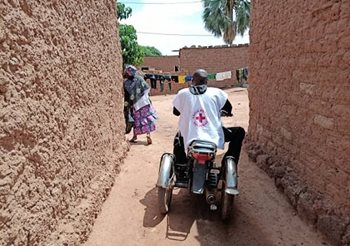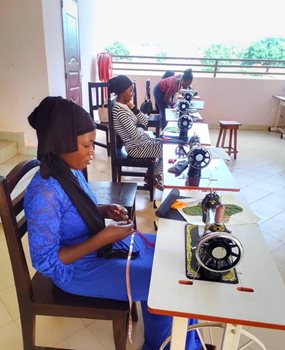Content warning: This story contains references to sexual violence that some people may find disturbing.
This year, in honour of the 16 Days of Activism Against Gender-Based Violence and the International Day of Persons with Disabilities, the Canadian Red Cross is highlighting our efforts to end gender-based violence in our communities and around the world.
 The Red Cross and Red Crescent Societies are known to millions of people in Africa. Dedicated staff and volunteers are often the first to respond to an emergency and may be the only support that remote communities receive.
The Red Cross and Red Crescent Societies are known to millions of people in Africa. Dedicated staff and volunteers are often the first to respond to an emergency and may be the only support that remote communities receive.Thanks to the generosity of the public and the Government of Canada, the Canadian Red Cross is working with its sister Societies through the West Africa Partnership Program. One of the goals of the partnership is to enhance the capacity of the Mali Red Cross to develop and implement programming that will help communities become stronger, healthier, and more resilient. Since 2012, the Government of Canada has been providing funding for the Mali Red Cross’ projects to support them and the Mali Ministry of Health and Social Development (MHSD) in delivering health services to rural communities.
This led the Canadian Red Cross team in Mali, in partnership with the Mali Red Cross and the MHSD, to launch a component of a project for people with disabilities. It is being implemented using a two-pronged approach.
Including people with disabilities as volunteers
The first approach involves including people with disabilities as Mali Red Cross volunteers. “In other projects, the Mali Red Cross usually only takes on people without disabilities as volunteers. But with our current project, the Canadian Red Cross innovated by encouraging the Mali Red Cross to bring on a certain number of people with physical disabilities (two per village) as project volunteers. These people have been doing community outreach since August 2020,” says Dr. Bintou Coulibaly, a physician and technical reference professional for health, who has worked at the Canadian Red Cross since 2017 and provides general support for implementing the project.
Thanks to this project, people with disabilities now account for 133 of the 1,272 volunteers. During the process of implementing the project, multiple discussions were held with associations for people with disabilities and the Ministry of Health to include these marginalized community members. As a result, volunteers have held 34,464 COVID-19 awareness sessions, with 8.36 per cent of those session presented by volunteers with disabilities.
With this inclusivity, much has changed, and preconceived ideas very quickly changed for the better. People with disabilities are going to health centres much more often without fear of judgment. Additionally, local health facilities now have increased visibility of and more appreciation for people with disabilities. For example, 44 per cent of health centres have built ramps since this approach was implemented. “As a health centre manager said, it may sound trivial, but it’s a way of letting [people with disabilities] know that our doors are open for them. Come see us,” says Dr. Coulibaly.
Additionally, since becoming involved at the Red Cross, volunteers with disabilities are feeling valued by the community and are no longer afraid of feeling alone. “You can see these changes from hearing people’s stories. For example, a student who volunteers with the Red Cross used to hide and was afraid of approaching people. But now, he’s a star. He’s no longer scared to go to school and feels proud, since people see him differently. It’s really encouraged him.”
Keeping young girls safe from violence with sewing
 The second approach consists of a sewing training activity for 146 young girls, including 34 who live with disabilities, to keep them safe from sexual and gender-based violence, including early and forced marriage.
The second approach consists of a sewing training activity for 146 young girls, including 34 who live with disabilities, to keep them safe from sexual and gender-based violence, including early and forced marriage.Due to the COVID-19 pandemic, classrooms had been forced to remain closed for nearly five months. Because of these closures, many young girls were at risk of being given away in forced marriages or sent off to big cities to become housekeepers, where they could be subject to abuse, violence, and sexual exploitation. The sewing training centre was a way to keep them busy during this time and away from this violence.
How the Canadian Red Cross is helping
The Mali Red Cross has been working to implement both approaches, with technical and financial support from the Canadian Red Cross, including three technical delegates who plan activities.
“We’re nearing the end of the project, so we’ve come a long way and overcome various challenges. However, one of the biggest challenges is gender and social inclusion. Our goal for recruiting volunteers was to have 50 per cent women. This was very difficult in the beginning, and some villages weren’t open to the idea, since the village leaders didn’t want to have women as outreach workers. As a result, we organized teams to advocate for why we needed to include more women, and above all, why we needed to bring in people with disabilities as outreach workers. There’s still more work to be done, but we’ve come a long way. And since this was our first time using this approach (with people with disabilities), we’re really proud”, says Dr. Coulibaly.
From a personal standpoint, Dr. Coulibaly confides that she is very proud to be able to bring both inclusion and smiles not only to the community, but also to people who have felt marginalized in the past, but now feel valued. “I heard a story from one of our volunteers recently that I was really touched by. He used to have low self-esteem, but now feels like a whole person, someone who contributes to their community. People are giving him recognition instead of rejecting him. It’s gratifying for him to feel valued and useful.”
“Here in Mali, people with disabilities, and particularly women, are dominated and have almost no voice - especially in rural communities. The project has sparked a change in its areas of intervention. We’ve been able to change that mentality a little. People with disabilities now have more self-esteem and are accessing health services with confidence.”
Related stories:

